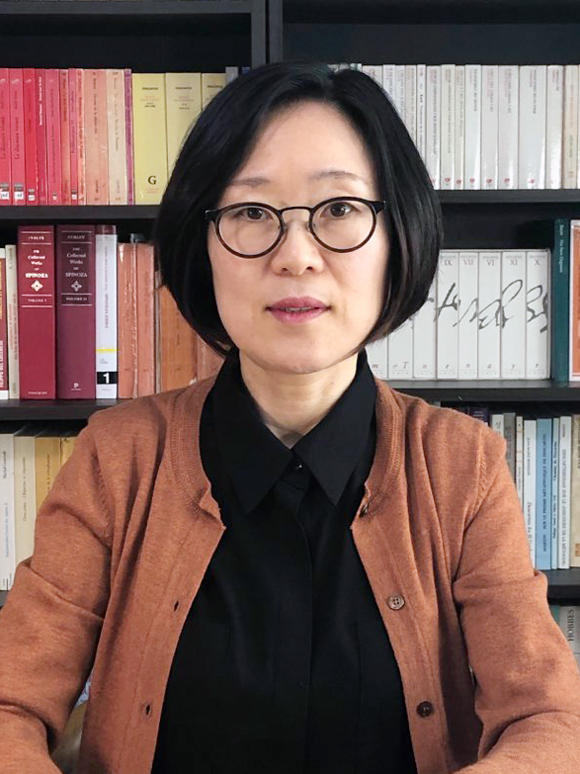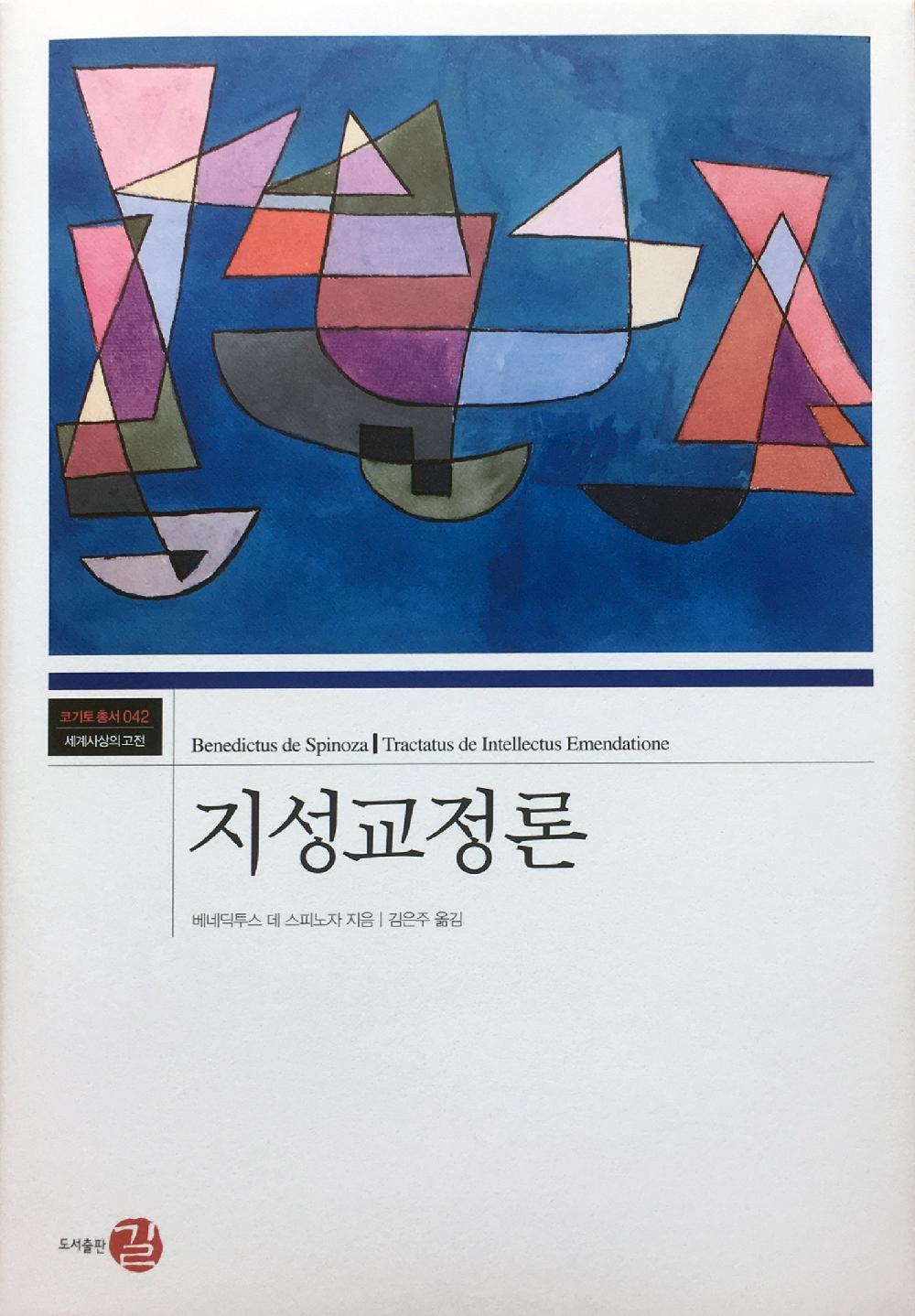Touching Tomorrow atPukyong National University
NEW BEGINNING, NEW INSPIRATION
Pukyong Today List
| Spinoza's window unclosed by Prof. Kim Eun-joo of Pukyong National University | |||
| WRITER | Department of External Cooperation | WRITE DAY | 2020-04-03 |
| COUNT | 231 | ||
| Spinoza's window unclosed by Prof. Kim Eun-joo of Pukyong National University | |||||
 |
Department of External Cooperation |  |
2020-04-03 |  |
231 |
|
’What is a perfectly proper way to lead intelligence to truly perceive things?’ This book is receiving much attention from great admirers of Spinoza in that it is a translation of the original text written in Latin by a Spinoza major. Professor Kim graduated from the Department of Korean Language Education at Seoul National University and received a master's degree in Spinoza research from the Department of Philosophy at the Graduate School, and then finished her doctorate. In 2012, she received a Ph.D. in philosophy from Ecole Normale Superieure de Lyon in France, a dissertation on the concept of causality of Spinoza. The book is short, but actually it is not easy to finish reading all. For that reason, what if we make this difficult book a worthy companion of 'Jeebkok (means, 'be stuck at home')', which continues because of COVID 19 these days? Spinoza did not tell you? 'All the noble things are not only difficult but also rare.' Now, let's go into 『Theory of Intellectual Emendation』, which Professor Kim translated the original Latin text into Korean. The bibliography that Professor Kim put at the end of the book is a good guide to lead the readers into this solid, brick-like book. The subtitle on this book is so long as this. 'A contention that the best way to emend intelligence and lead it to truly perceive things.' According to the bibliography, it was said that Schopenhauer recommended the introduction of 『Theory of Intellectual Emendation』 as ‘the most powerful method to calm the storm of emotions’ as far as he knows. Spinoza begins the famous and fascinating prologue like this. 'Since the experience have taught me that everything that happens frequently in my ordinary life is empty and vain, I realized that there is nothing good or bad in itself unless all the things I used to worry about and made me worry are not limited to the movements of the mind, because of them I finally decided. Something that can be preached even though it is true virtue, and with that alone, there is something else that is going to get back and the mind will respond, furthermore, once I discover and acquire, I mean I decided to look for something that would make me taste the best joy forever and continuously.' Spinoza continues. 'To be evaluated as a Summum bonum (the highest goodness) among people is divided into three categories. It is wealth, honor, and lust. These three things distract your mind so you cannot think of any other virtue.' (p.21) Let us follow Professor Kim's annotation. The goodness of general virtue such as lust, wealth, and honor is uncertain by nature. The joy of enjoying these things is soon overturned in sorrow or it accompanies sorrow. In contrast, the goodness of true virtue is certain in nature, however its acquisition is uncertain. Furthermore, indulging in an uncertain virtue in nature is fatal to preserving existence, and for this reason the narrator (Spinoza) says that even if the acquisition of true virtue is uncertain, it is unavoidable to explore. (p.182) Then, what is the true virtue that the speaker claims to find? It is to reach the strong human nature that each of us thinks, and to reach with as many people as possible. First, Spinoza outlines our four ways of perception.
2. Perception from random experience. 3. Perception of reasoning from a result. 4. The perception that a thing is perceived only by its essence. Spinoza explains that the perception method of 1~3 does not perceive the essence of things and does not reach perfection. It means that there is a great risk of making errors. He says, 'Only the 4th method identifies the proper nature of the object and there is no risk of error. Therefore, this method should be used to the maximum.’ (p.41) Spinoza pointed out that ‘prejudice’ and the ‘passiveness of the consciousness’ that satisfies simple and fragmentary perceptions as obstacles to the operation of the mind trying to reach true notion. Beware of prejudice and the passiveness of the consciousness! Then, what are the ways we can reach true notion? Spinoza tells you to distinguish true perception from fiction, false, and suspicious perception. Fiction, false, and suspicious perception arise from a lack of awareness that is, if one cannot recognize the inevitability or contradiction of things. Spinoza recommends that we better understand the order of nature in order to better understand things in the book. 'The more the mind perceives, the better it understands its own power and the order of nature. Furthermore, the more the mind knows its strength, the easier it is to lead itself and suggest rules to itself. Also, the better it understands nature's order, the easier it is for the mind to take control of itself to avoid unnecessary use. As we said, these are the essence of the method.' (p.49) Spinoza said that the mind is always directed toward the body, so the experience of the body will be the basis for elevating the mind. Therefore, in order to better understand one's power or the order of nature, the experience of the body and the understanding of the order of nature will be most important. Furthermore, a passage in this book, which contains universal and determinism, which is Spinoza's core ideology, may give some readers unlimited freedom. 'It follows from the fact that when you think of things as true, the soul continues to form the same results in a representative way, because there is nothing in nature that can be against the laws of nature, instead, everything is done according to certain laws of nature, and therefore, the results of these laws are produced in a tireless chain according to certain laws.' (p.71) Especially, Spinoza's insight into 'speech' will also be a useful life tip for all of us today. 'Because speech is a part of our imagination, in other words, as words are randomly developed in memory according to a certain arrangement of the body, we create many concepts in fiction. Therefore, there is no doubt that words of speech can cause as many errors as we imagine if we are not extremely vigilant.' (p.97) Even if we do not necessarily recall Spinoza's message that 'our mind cannot control the body (speech)', it means 'what we must be extremely wary of’. In this book, Spinoza explains about people who do not even know or do not even try to know the essence or truth of things, and who do not know what they do not know, people who deny, yield, or oppose even if someone else prove something, or for those who do not even know what they are denying, yielding or opposing, Spinoza says, 'must be regarded as an automatic machine that is totally lacking in mind'. (p.55) Spinoza argues that all things are perceived by essence or by cause, and that they must be recognized from individual essences, not abstractly, and in order to do so, we must derive other notions from the definition of things. (p.213) Professor Kim said, ‘(However, Spinoza) could not reach the definition of intelligence, but only lists the characteristics of intelligence. It is also an important part of Leibniz’s wistful remark on this, ‘Spinoza has stopped at the most anticipated passage.' How about we fill that disappointment through Spinoza's representative work, 『Ethics』? In the meantime, focusing on Spinoza mainly, Professor Kim is concentrating upon the studies on 17th-century philosophy such as Descartes and Hobbes, while studying contemporary French philosophy such as Michel Foucault, Jacques Derrida, and Jacques Lacan. Her writings include 『Finding of myself thinking, Discourse on the Method』 (Mirae-n, 2007) and 『Return of Spinoza』 (Co-write, Minumsa, 2017), and 『Philosophy in a time of terror: dialogues with Jürgen Habermas and Jacques Derrida』(Borradori, Giovanna, joint translation, Moonji, 2002), 『Individu et communauté chez Spinoza. Nouvelle éd.』(Matheron, Alexandre, joint translation, Greenbee, 2008), 『Spinoza et le spinozisme』 (Moreau, Pierre-François, joint translation, Editorial, 2019). <Pukyong Today> |
 Professor Kim Eun-joo of the Pukyong National University (Basic Liberal Arts Education Center · Photo) published Spinoza's early work, 『Theory of Intellectual Emendation』 which is called 'The Philosopher of Philosophers', in a book of parallel texts in Latin and Korean. (Total 260 pages , Gil)
Professor Kim Eun-joo of the Pukyong National University (Basic Liberal Arts Education Center · Photo) published Spinoza's early work, 『Theory of Intellectual Emendation』 which is called 'The Philosopher of Philosophers', in a book of parallel texts in Latin and Korean. (Total 260 pages , Gil) 1. Perceptions from rumors or some symbols that are stipulating.
1. Perceptions from rumors or some symbols that are stipulating.